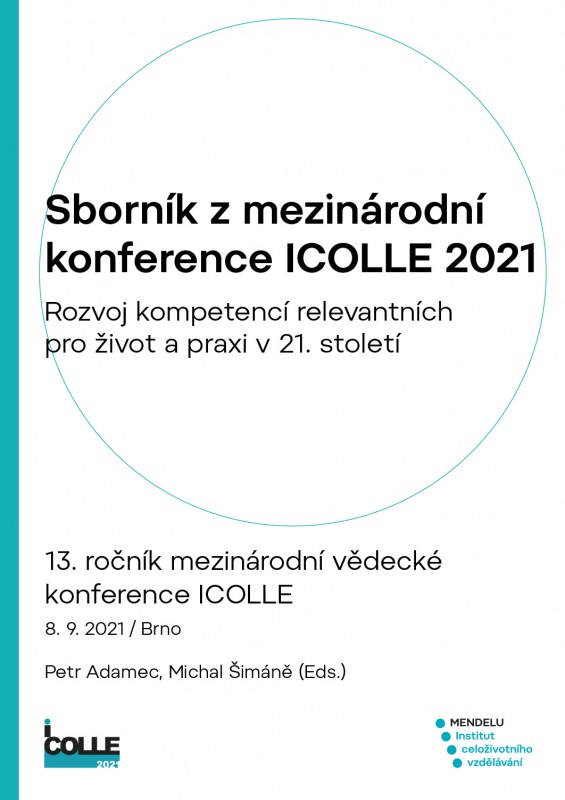
DOI: 10.11118/978-80-7509-832-0-0162
VYTVÁRANIE DIDAKTICKÝCH REFLEKTÍVNYCH KOMUNÍT AKO SÚČASŤ ZLEPŠOVANIA PEDAGOGICKÝCH ZRUČNOSTÍ. IDENTIFIKOVANIE PROBLÉMOV PRAXE
- Anna Sádovská, Martin Brestovanský
Professional learning communities are created by teachers who are interested in improving of their effectivity as professionals considering learning success of pupils. We discuss the practice of implementing specific model of the learning communities – instructional rounds in Slovak schools. In our paper, we are focused on the first step of that process – identifying problem of practice (connected to the methodology of teaching), which is realized in facilitated and structured meetings. At meetings, a special structure called protocol for examining of professional practice is implemented. Data in qualitative research are gained from video records and are analysed with the aim to follow the third and fourth steps of protocol to describe structures of clarifying and probing questions. Ten video records (January–June 2021) were created during the first sessions of instructional rounds. We are interested in the quality of questions and statements (non-judgemental and descriptive language, questions for clarifying and probing). As the model of structured protocol was new for all participants, our findings help us to identify strengths and weaknesses of protocol and complete its contain to make it more detailed for professional needs.
Keywords: problem of practice, clarifying and probing questions, protocol for examining professional practice, instructional rounds
pages: 162-171, online: 2022
References
- Bolam, R., et al. (2005). Creating and sustaining effective professional learning communities.London, UK: General Teaching Council for England, Department for Education and Skills. Research Report Number 637.
- Brestovanský, M. (2019). Didaktické reflektívne komunity: paradigma vzájomnej pomoci vs. paradigma posudzujúceho hodnotenia v rozvoji kvality vzdelávania, Pedagogika,10(1), 27-46.
- Brestovanský, M., Kotuľáková, K. (2020). Ako identifikovať problém praxe vo vyučovaní na našej škole. Trnava: Pedagogická fakulta Trnavskej univerzity v Trnave.
- Brown, K. C. (2018). The Impact of Instructional Rounds on Teacher Learning. Dizertačná práca. Walden University.
- City, E. A., et al.(2009). Instructional rounds in education: A network approach to improving teaching and learning. Cambridge, MA: Harvard Education Press.
- Del Prete, T. (2013). Teacher Rounds: A Guide to Collaborative Learning in and from Practice. Thousand Oaks, CA: Corwin Press.
 Go to original source...
Go to original source... - DeLuca, C., et al. (2015). Instructional Rounds as a professional learning model for systemic implementation of Assessment for Learning, Assessment in Education: Principles, Policy & Practice, 22(1), 122-139. Doğan, S. & Adams, A. (2018). Effect of professional learning communities on teachers and students: reporting updated results and raising questions about research design, School Effectiveness and School Improvement, 2018, 1-26. https://doi.org/10.1080/09243453.2018.1500921.
 Go to original source...
Go to original source... - Dowd, J. & D ́Anieri, J. (nedat.). Probing questions exercise. National School Reform Faculty. Harmony Education Centre. Dostupné na: https://www.nsrfharmony.org/wp-content/uploads/2017/10/probing_questions.pdf
- DuFour, R., Eaker, R. & DuFour, R. (Eds.). (2005). On common ground: The power of professional learningcommunities. Bloomington: Solution Tree.
- Easton, L. B. (2009). Protocol for professional learning. Alexandria, Virginia USA: ASDC. Frederick, C. (2019). What happens when teachers participate in Teacher Rounds? Dizertačná práca. College of Business, Arts and Social Science Brunel University London.
- Fowler-Finn, T. (2013). Leading instructional rounds in education: A facilitator ́s guide. Cambridge, US: Hardvard Educational Publishing Group.
- Hatch, T., Hill, K., & Roegman, R. (2016). Investigating the Role of Instructional Rounds in the Development of Social Networks and District-Wide Improvement. American Educational Research Journal, 2016, 1-32.
 Go to original source...
Go to original source... - Lee, J. C. K., Zhang, Z. & Yin, H. (2011). A multilevel analysis of the impact of a professional learning community, faculty trust in colleagues and collective efficacy on teacher commitment to students, Teaching and Teacher Education, 27(5), 820-830.
 Go to original source...
Go to original source... - Lund, L. (2018). When school-based, in-service teacher training sharpens pedagogical awareness. Improving Schools, 2018, 1-15. https://doi.org/10.1177/1365480218772638
 Go to original source...
Go to original source... - Moran, W. (2014). Enhancing Understanding of Teaching and the Profession Through School Innovation Rounds. Australian Journal of Teacher Education, 39(3), 68-85.
 Go to original source...
Go to original source... - McDonald, J. P. et al. (2003). The power of protocols: an educator's guide to better practice.
- Philpott, C. & Oates, C. (2015). What Do Teachers Do When They Say They Are Doing Learning Rounds? Scotland's Experience of Instructional Rounds. European Journal of Educational Research, 4(1), 22-37.
 Go to original source...
Go to original source... - Schaap, H. & de Bruijn, E. (2018). Elements affecting the development of professional learning communities in schools. Learning Environments Research, 21, 109-134.
 Go to original source...
Go to original source... - Schaap, H., et al. (2019). Tensions experienced by teachers when participating in a professional learning community. Professional Development in Education, 2019, 45(5). https://doi.org/10.1080/19415257.2018.1547781.
 Go to original source...
Go to original source... - Skaalvik E. M. & Skaalvik S. (2007). Dimensions of Teacher Self-Efficacy and Relations With Strain Factors, Perceived Collective Teacher Efficacy, and Teacher Burnout. Journal of Educational Psychology, 2007, 99(3), 611-625.
 Go to original source...
Go to original source... - Stoll, L. et al. (2006). Professional learning communities: a review of the literature. Journal of Educational Change, 7(4), 221-258.
 Go to original source...
Go to original source... - Troen, V. & Boles, K. C. (2014). The Power of Teacher Rounds. A Guide for Facilitators, Principals, and Department Chairs. Thousand Oaks: Corwin Press.
 Go to original source...
Go to original source... - Vangrieken, K., et al. (2017). Teacher communities as a context for professional development: A systematic review, Teaching and Teacher Education, 61, 47-59.
 Go to original source...
Go to original source... - Voelkel, R. H., Jr., & Chrispeels, J. H. (2017). Understanding the link between professional learning communities and teacher collective efficacy, School Effectiveness and School Improvement, 2017. https://doi.org/10.1080/09243453.2017.1299015
 Go to original source...
Go to original source...


